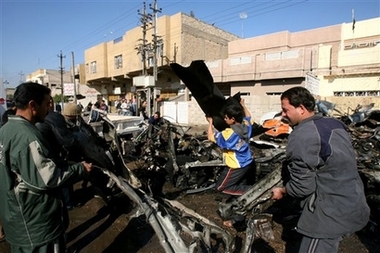12 dead in Baghdad car bombs, attacks
(AP)Updated: 2007-01-31 21:49
BAGHDAD, Iraq - A series of car bombs struck mostly Shiite areas in Baghdad on Wednesday, killing eight people, while a mortar attack on a Sunni neighborhood killed four in more retaliatory sectarian violence.
 People clean up after a car bomb blast in predominantly Shiite area in eastern Baghdad, Iraq, Thursday, Jan. 31, 2007. At least one person was killed and six were wounded in the blast. [AP]  |
One of the blasts targeted a transit area in central Baghdad where people can catch minibuses to predominantly Shiite neighborhoods, including the sprawling Sadr City slum. The attack occurred at 12:45 p.m. on Jamhuriyah Street near the busy Shorja market, killing four people and wounding 12 others, police said.
Shorja, one of Iraq's largest markets, has been struck frequently by bombings, including one on Nov. 21 that killed 25 civilians.
Another car packed with explosives blew up in the religiously mixed neighborhood of Maamoun in western Baghdad at about the same time, killing two civilians and wounding three others, police said, adding the target of the attack was not immediately known.
Insurgents have launched several bombings in the capital in recent weeks as they seek to maximize the number of people killed before U.S.-Iraqi troops launch a neighborhood-by-neighorhood sweep of the city of 6 million. Iraqi authorities have promised to crack down on Sunni insurgents as well as Shiite militia violence that has spiraled since the Feb. 22, 2006, bombing of a Shiite shrine in Samarra.
A car bomb also struck a predominantly Shiite area in eastern Baghdad earlier Wednesday, killing two people and wounding 10, police said.
The explosion occurred at 10 a.m. after the driver parked the car near a currency exchange office in the Amin district in New Baghdad neighborhood, then walked away.
"A seemingly normal person parked this car and told us that he would not be long," said the owner of the currency exchange who identified himself as Abu Talal. "When that person disappeared for more than 20 minutes, we tried to call the police but the car exploded as we were trying to do so."
Shop owners often insist that motorists get permission before parking their cars due to the frequent bombings in the capital, which faces rising sectarian violence.
Police found the body of one person killed thrown into a nearby alley by the force of the blast, while six others were wounded. The blast also damaged several nearby shops.
Nine mortar shells slammed into different areas in Azamiyah, landing on houses and streets and burning a car in the predominantly Sunni neighborhood in northern Baghdad. Four people were killed, including two children, and 16 were wounded, some seriously, Mohammed al-Mashhadani from the al-Numaan hospital said.
Nobody claimed responsibility for any of the attacks, but bombings against Shiite targets followed by mortar attacks targeting Sunni has become a common pattern in the violence plaguing Baghdad.
Iraqi security forces also have been frequent targets of insurgent attacks as they are seen as collaborators with U.S.-led forces.
A suicide bomber driving an oil truck blew himself up after he was stopped at a checkpoint near an Iraqi army headquarters north of Baghdad on Wednesday, wounding 9 soldiers, an officer said.
The attacker apparently planned to drive the truck into the compound in Muqdadiyah, but guards stopped him at the checkpoint about 100 yards away at about 9:15 a.m. He detonated his belt of explosives as he got out of the vehicle, causing it to explode as well, army Col. Ibrahim Hussein said.
The blast came just over a month after a suicide bomber struck a police station in Muqdadiyah, 60 miles north of Baghdad, killing seven officers.
A parked car bomb also struck a police patrol in the northern city of Mosul about 10:30 a.m., killing one policeman and wounding two others, Brig. Abdul Karim al-Jibouri said.
In the volatile western cities of Fallujah and Ramadi, at least eight bodies were found with their hands and legs bound and showing signs of torture.
The bloodshed Tuesday took place despite heightened security following a battle with messianic Shiites who authorities said planned a large assault on Ashoura ceremonies. With security so intense at the main venues, extremists chose targets in smaller cities where safety measures were less stringent.
A suicide bomber blew himself up among a crowd of worshippers entering a Shiite mosque in Mandali near the Iranian border, killing 26 people and wounding 47, according to police. At least 12 more died and 28 were wounded when a bomb exploded in a garbage can as Shiites were performing outdoor rituals in the largely Kurdish city of Khanaqin, police said.
In Baghdad, gunmen in two cars opened fire on a bus carrying pilgrims to the capital's most important Shiite shrine, killing seven and wounding seven, police said. Hours later, mortar shells rained down on two mostly Sunni neighborhoods, killing nine and wounding 30 in what police said appeared to be a reprisal attack.
A morgue official in the southeastern city of Kut, meanwhile, said his facility received six more bodies from previously unreported Ashoura-related violence on Tuesday.
Those included a suicide bomber who detonated his explosives belt at a checkpoint aimed at protecting a religious procession in Hafriyah and the two people killed in the attack. A police commander and two of his guards also were killed by gunmen while they were on patrol protecting Ashoura processions in Aziziya, also south of Baghdad.
|
||
|
||
|
|